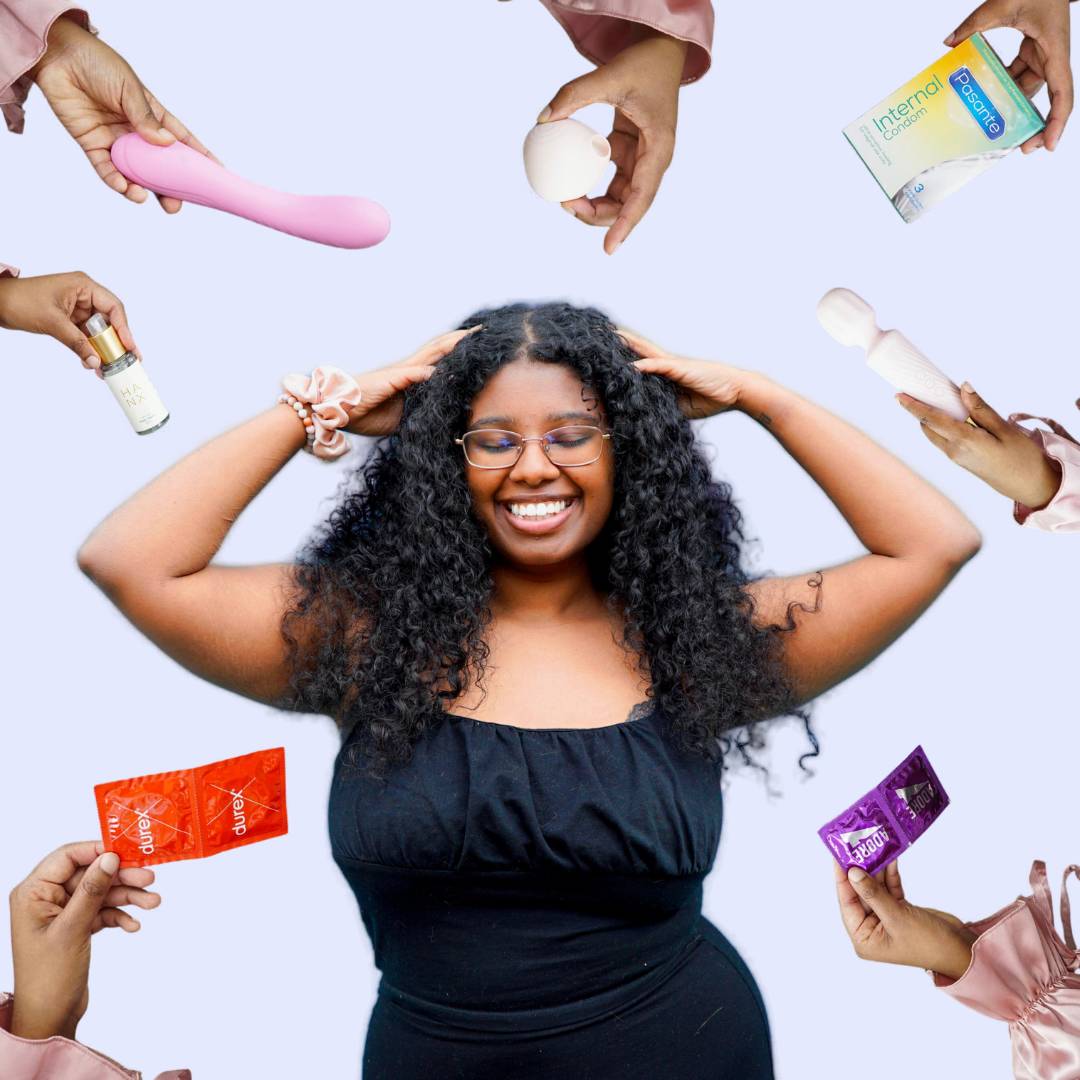In a world where conversations about sex, pleasure, and intimacy are still tiptoed around, Amari stands unapologetically in the open. An accredited sexologist, relationship educator, and certified coach, she dismantles the shame, stigma, and silence that keep so many disconnected from their erotic truth — whether they are women, men, or individuals with a penis navigating unique pressures and expectations.
Her approach is more than educational; it’s personal, raw, and radically inclusive, grounded in the belief that everybody and every identity deserves pleasure without apology. She guides clients through everything from performance anxiety and body image to emotional intelligence and intimacy, always creating a safe space for curiosity to flourish.
When we sat down with Amari, we wanted to peel back the layers and discover the first spark, the intimate moment that set her on a journey to rewrite how the world talks about sex.

From Disconnection to Desire
You’ve shared that you once felt disconnected from your own sexuality. Can you walk us through the moment you decided to not only reclaim your desire but help others do the same? How did that personal shift lay the foundation for your coaching work today?
Amari: I don’t think there was a single “lightbulb moment” where I made the decision, but I always felt like, despite working as a sex-positive virtual assistant, talking about sex all day, there was a major disconnect in my bedroom. And I wasn’t experiencing the fulfilling sex life I was craving.
I started my sex coach training because I wanted to learn everything I could about desire and pleasure, because I was interested and wanted to climb the corporate ladder and be more qualified, and learn more for my sake. Helping others was a bonus, but the self-discovery and being able to say I was a qualified professional were the most important things for me.
Fast forward to today, I’m able to genuinely put myself in my clients’ shoes and approach every session with deep empathy and real-life understanding thanks to taking the steps I did. In the past few years, I’ve learned about how important it is to be open-minded and willing to engage with most issues.
One key thing I took away from my training was to try everything once, within reason, so I can fully grasp where a client is coming from and hold space for any experience they bring up. I know that my lived experiences, combined with the training I’ve undertaken, make me a better coac,h and that’s what I want to be for every single client I work with.
Living with PCOS, Dyslexia, and Sobriety
You’ve spoken openly about living with PCOS, being dyslexic, and being sober for three years. How have these personal experiences shaped the way you approach intimacy, relationships, and self-care?

Amari: Living with PCOS has given me a deeper understanding of how internal health can affect confidence, especially when it comes to body image. While I’ve always been comfortable and confident in my own skin, I know this isn’t the case for everyone living with the condition, but I still think it’s important to be open about it and support others who are struggling with this.
Being dyslexic hasn’t had any effect on my intimacy, relationships, or self-care but getting sober three years ago changed my relationship with sex. Before I stopped drinking, I’d only ever had sex while drinking, so sober sex was something new for me. I did not find it scary,but it was defo different and you have to have more confidence being sober (which luckily I have always had lots of, so was not a huge shift!)
The best part of it is that it’s helped with my overall social confidence, and I’m able to be genuinely present with whoever I’m sleeping with and clear about what I want during sex.
Breaking Stigma Around Kink and Sex Work
You work in spaces that society still misunderstands or judges. What’s the most profound lesson you’ve learnt from your clients in the kink, BDSM, and sex work communities that you wish everyone could understand?
Amari: You work in spaces that society still misunderstands or judges. What’s the most profound lesson you’ve learnt from your clients in the kink, BDSM, and sex work communities that you wish everyone could understand?
I think the most profound lesson I’ve learnt is that informed consent is at the heart of human connection. Working in this space has shown me that intimacy isn’t about being passive but rather participating actively and openly discussing exactly what you want and don’t want. The honest, upfront communication around boundaries is incredible to see and something I wish everyone could experience in their day to day.
When working with clients, I often use the FRIES framework, which focuses on the fact that agreement must be Freely given, Reversible, Informed, Enthusiastic, and Specific. This structured, respectful approach to setting expectations and checking in should really be the standard for all relationships, not just in kinky or professional settings.

Ownership Over Your Body
As a pro-choice, sex-positive coach, you’ve seen how outside judgment can complicate deeply personal decisions. How do you help people trust themselves when it comes to choices about their bodies?
Amari: In my opinion, the most important thing I do is help my clients own their choices without feeling any unnecessary shame. We spend so much time listening to judgement from society, religion, or media that we forget how to hear ourselves.
I believe that trusting yourself is a skill, and by prioritising your own health and happiness, you build the confidence needed to embrace any choice completely. I always remind my clients that they shouldn’t take what others think or say personally, because they’re the ones living their life and staying true to themselves.

Myths That Hold Us Back
In your experience, what’s the most common myth about sex and relationships that keeps people from experiencing true intimacy?
Amari: It’s hard to experience true intimacy if you think that great sex is something you’re either naturally good at or not, instead of seeing it as a skill that needs to be practised and developed so you can improve at it. I hate how this belief creates pressure and stops people from seeing that intimacy can be improved through communication and experimenting.
I also know that many people think that sex is just about penetration or related to genitals, which is a very limiting state of mind. Real intimacy goes beyond that and as someone who has spent years learning about it, it’s truly fascinating and I think it’s important for people to try new things and be open minded.
Keeping the Spark Alive
Relationships, sexual or otherwise, evolve over time. What’s your go-to advice for couples who want to keep curiosity and exploration alive after years together?
Amari: My best piece of advice would be to treat your relationship and your sex life like an ongoing project and stay curious and keep learning. As the years go by, people change, and it’s important to get to know the new versions of each other! This can be done by setting aside quality time to connect with one another, because nothing kills the spark like neglecting it and assuming it will just stay alive on its own. You need to put in the effort and try new things.
Consider getting some new toys, talking about your fantasies, or visiting a new location together, and remember that there is genuinely no such thing as failing when you’re both experimenting.

Looking at the bigger picture
What do you hope the next generation understands about sex, relationships, and self-love that perhaps our generation was never taught?
Amari: I really hope that the next generation understands that consent and boundaries are the foundations for every single interaction they have, not just the sexual ones. Our generation wasn’t fully taught that openly discussing what we want or don’t want is important, and it’s something that I think should be passed on to the next generation
I also hope that pleasure is more spoken about when they have sex education and engage in conversations about sex with others. Sex is about mutual enjoyment, intimacy, and feeling good, not just reproduction or avoiding risk, which is what many of us were taught.
Finally, if you could leave readers with one truth about wellness, relationships, or intimacy that you wish everyone carried with them, what would it be?
Amari: Nothing changes if nothing changes. We all have that gut feeling when something isn’t working, but too often, we just hope things will magically work themselves out on their own. No matter what it is that you want, be that a better sex life, a healthier relationship with your body, or deeper friendships, you have to be the one to take action and initiate the change. Taking a small step towards starting is better than not doing anything at all, so stop waiting for the perfect moment or for someone else to fix things and be brave.

Editor’s Note
Amari shows us that pleasure, intimacy, and self-love are not luxuries—they are rights. Her work dismantles shame and stigma, encouraging us to explore desire openly, set boundaries with confidence, and embrace every part of ourselves. Every experience, every craving, deserves acknowledgment.
True sexual freedom begins within: by trusting ourselves, speaking our truths, and honoring our needs without apology. Amari’s approach is a reminder that intimacy is not a performance, but a journey of curiosity, empathy, and radical authenticity. When we own our desires, we don’t just experience pleasure, we reclaim our power.
Owning your desire isn’t just about pleasure—it’s about reclaiming your power, your boundaries, and your unapologetic self

